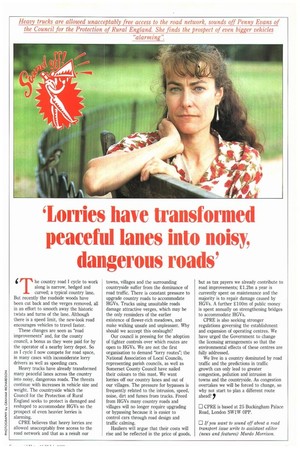'Lorries have transformed peaceful lanes into noisy, dangerous roads'
Page 45

If you've noticed an error in this article please click here to report it so we can fix it.
,T he country road I cycle to work along is narrow, hedged and curved; a typical country lane. But recently the roadside woods have been cut back and the verges removed, all in an effort to smooth away the historic twists and turns of the lane. Although there is a speed limit, the new-look road encourages vehicles to travel faster.
These changes are seen as "road improvements and, for the county council, a bonus as they were paid for by the operator of a nearby lorry depot. So as I cycle I now compete for road space, in many cases with inconsiderate lorry drivers as well as speeding cars.
Heavy trucks have already transformed many peaceful lanes across the country into noisy, dangerous roads. The threats continue with increases in vehicle size and weight. The countryside which the Council for the Protection of Rural England seeks to protect is damaged and reshaped to accommodate HGVs so the prospect of even heavier lorries is alarming.
CPRE believes that heavy lorries are allowed unacceptably free access to the road network and that as a reSult our
towns, villages and the surrounding countryside suffer from the dominance of road traffic. There is constant pressure to upgrade country roads to accommodate HGVs. Trucks using unsuitable roads damage attractive verges, which may be the only reminders of the earlier existence of flower-rich meadows, and make walking unsafe and unpleasant. Why should we acccept this onslaught?
Our council is pressing for the adoption of tighter controls over which routes are open to HGVs. We are not the first organisation to demand "lorry routes"; the National Association of Local Councils, representing parish councils, as well as Somerset County Council have nailed their colours to this mast. We want lorries off our country lanes and out of our villages. The pressure for bypasses is frequently related to the intrusion, speed, noise, dirt and fumes from trucks. Freed from HGVs many country roads and villages will no longer require upgrading or bypassing because it is easier to control cars through road design and traffic calming.
Hauliers will argue that their costs will rise and be reflected in the price of goods, but as tax payers we already contribute to road improvements; Z1.2bn a year is currently spent on maintenance and the majority is to repair damage caused by HGVs. A further 10Orti of public money is spent annually on strengthening bridges to accommodate HGVs.
CPRE is also seeking stronger regulations governing the establishment and expansion of operating centres. We have urged the Government to change the licensing arrangements so that the environmental effects of these centres are fully addressed.
We live in a country dominated by road traffic and the predictions in traffic growth can only lead to greater congestion, pollution and intrusion in towns and the countryside. As congestion overtakes we will be forced to change, so why not start to plan a different route ahead? y
LI CPRE is based at 25 Buckingham Palace Road, London SW1W OPP.
0 If you want to sound off about a road transport issue write to assistant editor (news and features) Murdo Morrison.
















































































